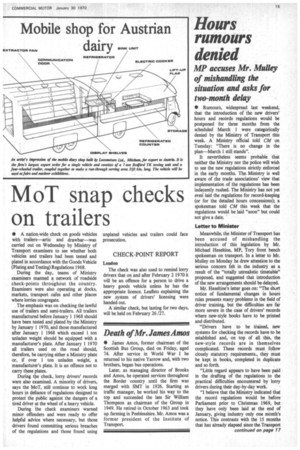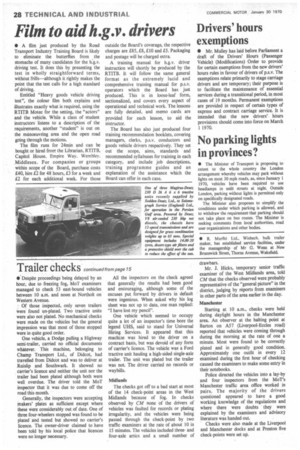MoT snap checks on trailers
Page 17

Page 30

If you've noticed an error in this article please click here to report it so we can fix it.
• A nation-wide check on goods vehicles with trailers—artic and drawbar—was carried out on Wednesday by Ministry of Transport examiners to see whether both vehicles and trailers had been tested and plated in accordance with the Goods Vehicle (Plating and Testing) Regulations 1968.
During the day, teams of Ministry examiners manned a network of roadside check-points throughout the country. Examiners were also operating at docks, markets, transport cafes and other places where lorries congregate.
The emphasis was on checking the lawful use of trailers and semi-trailers. All trailers manufactured before January 1 1968 should have been tested and plated by the Ministry by January 1 1970, and those manufactured after January 1 1968 which exceed 1 ton unladen weight should be equipped with a manufacturer's plate. After January 1 1970 all trailers used on the road should, therefore, be carrying either a Ministry plate or, if over 1 ton unladen weight, a manufacturer's plate. It is an offence not to carry these plates.
During the check, lorry drivers' records were also examined. A minority of drivers, says the MoT, still continue to work long hours in defiance of regulations designed to protect the public against the dangers of a tired driver at the wheel of a heavy vehicle.
During the check examiners warned minor offenders and were ready to offer helpful advice where necessary, but those drivers found committing serious breaches of the regulations and those found using unplated vehicles and trailers could face prosecution.
CHECK-POINT REPORT
London The check was also used to remind lorry drivers that on and after February 2 1970 it will be an offence for a person to drive a heavy goods vehicle unless he has the appropriate licence. Leaflets explaining the new system of drivers' licensing were handed out.
A similar check, but lasting for two days, will be held on February 26 /27.
• Despite proceedings being delayed by an hour, due to freezing fog, MoT examiners managed to check 53 east-bound vehicles between 10 a.m. and noon at Northolt on Western Avenue.
Of those inspected, only seven trailers were found un-plated. Two tractive units were also not plated. No mechanical checks were made on the vehicles but the general impression was that most of those stopped were in quite good order.
One vehicle, a Dodge pulling a Highway semi-trailer, carried no official documents whatever. This machine, belonging to Champ Transport Ltd., of Didcot, had travelled from Didcot and was to deliver at Ruislip and Southwark. It showed no carrier's licence and neither the unit nor the trailer had been plated although both were well overdue. The driver told the MoT inspector that it was due to come off the road this month.
Generally, the inspectors were accepting makers' plates as sufficient except where these were considerably out of date. One of three four-wheelers stopped was found to be plated and tested but showed no carrier's licence. The owner-driver claimed to have been told by his local police that licences were no longer necessary. All the inspectors on the check agreed that generally the results had been good and encouraging, although some of the excuses put, forward by drivers in default were ingenious. When asked why his log sheet was not up to date, one man replied: "I have lost my pencil".
One vehicle which seemed to occupy quite a lot of an inspector's time bore the legend UHS, said to stand for Universal Hiring Services, It appeared that this machine was hired to the driver on a contract basis, but was devoid of any form of carrier's licence. The vehicle was a Ford tractive unit hauling a high-sided single-axle trailer. The unit was plated but the trailer was not. The driver carried no records or waybills.
Midlands The checks got off to a bad start at most of the 14 check-point areas in the West Midlands because of fog. In checks observed by CM none of the drivers of vehicles was faulted for records or plating irregularity, and the vehicles were being passed through the check point by two traffic examiners at the rate of about 10 in 15 minutes. The vehicles included threeand four-axle artics and a small number of drawbars.
Mr. J. Hicks, temporary senior traffic examiner of the West Midlands area, told CM that the checks observed were probably representative of the "general picture" in the district, judging by reports from examiners in other parts of the area earlier in the day.
Manchester Starting at 10 a.m., checks were held during daylight hours in the Manchester area. An observer at the halting point at Barton on A57 (Liverpool-Eccles road) reported that vehicles were coming through during the morning at the rate of one a minute. Most were found to be correctly plated and in generally good condition. Approximately one outfit in every 12 examined during the first hour of checking caused the examiners to make some entry in their notebooks.
Police directed the vehicles into a lay-by and four inspectors from the MoT's Manchester traffic area office worked in pairs. The majority of the drivers questioned appeared to have a good working knowledge of the regulations and where there were doubts they were explained by the examiners and advisory literature was handed out.
Checks were also made at the Liverpool and Manchester docks and at Preston five check-points were set up.






























































































